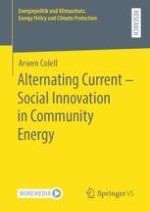2021 | OriginalPaper | Chapter
4. Research Design and Methods
Author : Arwen Colell
Published in: Alternating Current – Social Innovation in Community Energy
Publisher: Springer Fachmedien Wiesbaden
Activate our intelligent search to find suitable subject content or patents.
Select sections of text to find matching patents with Artificial Intelligence. powered by
Select sections of text to find additional relevant content using AI-assisted search. powered by
